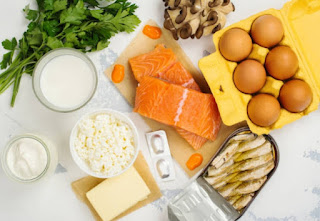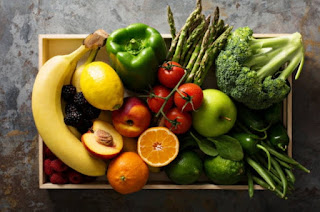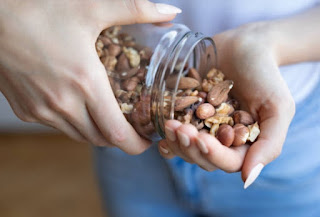1.Eat a healthy diet:
You need to eat well as a college student to fuel your body for a highly busy era in your life, from class to study time to work time (and even some time to game). You may believe you don't have enough time to eat properly Or perhaps you're unsure what it means to eat properly.
Let's begin with that:
A healthy diet consists of consuming the proper proportions of protein, fat, and carbs in the form of nutritious meals. This implies two or more cups of vegetables, a cup of fruit, a couple servings of complete grains, and two or three servings of protein are required each day.
The most prevalent errors are not eating enough fruits, vegetables, or high-fiber foods, as well as consuming too many fried foods, junk foods, sugary snacks, and sodas. Tips on how to eat healthily as a college student can be found in this lecture. 2.To each meal, add a tiny piece of fruit or a serving of bright vegetables:
The majority of individuals consume insufficient amounts of fruits and vegetables. It's a shame, because fruits and vegetables are not only beneficial for your health, but they're also delicious. So, my first piece of advice is to include fruit or veggies in every meal you can.
It's simple; all you have to do is pay attention to what you're doing. This is something you can do practically anyplace you dine. Sliced fruit, raisins, or fresh berries can be added to a bowl of cereal or oatmeal for breakfast. Alternatively, a glass of orange or grapefruit juice will suffice.
Choose green beans or raw crispy carrots to go with your sandwich for lunch. Instead of ice cream, finish the meal with an apple or banana. Dinner follows the same pattern. You can play together even if you're out eating pizza with buddies. To go with your pizza, order a salad or, at the very least, veggies as a topping instead of greasy meats. Each day, consume 2 to 3 cups of veggies and a plate or two of fruit. 3.Incorporating additional calcium sources:
Calcium is necessary for blood coagulation, muscle and neuron function, dental health, and bone strength, among other things.In fact, until you reach the age of 30, you are increasing your bone mass, making it more difficult to add calcium to the bone. Take advantage of this window of opportunity and watch a lot of football every day. Milk and dairy products are high in calcium.
Drink a glass of milk with your meals or try Greek yoghurt with fresh berries, almonds, and honey. Cheese is a good source of calcium as well, but keep in mind the calories. An ounce or two of cheese constitutes a serving. That's around the same size as two dice. If milk isn't your thing, there are still plenty of calcium-rich foods to choose from.
Calcium can be found in dark green leafy vegetables, nuts and seeds, and cow's milk replacements such as soy milk, rice milk, or almond milk. Each day, you should consume around three servings of calcium-rich foods. You can take a dietary supplement if you don't think you're getting enough. You might also take a vitamin D pill, which is especially beneficial in the winter.
4.Increase your water intake:
Your body requires water, and you will not feel well if you become dehydrated. Water also has no calories, so it's a wonderful drink to have if you're trying to lose weight. I understand that plain water can be boring, but add some flavour with sliced fruit or cucumber.
Although tap water is unlikely to be totally safe, the taste of it may be unpleasant depending on how it is treated. You can either buy bottled water or filter your water with a pitcher. Sparkling water is also a wonderful option, but be wary of flavoured kinds. Some flavoured sparkling waters have just a hint of fruit flavour, but others are practically sugary drinks, so read the labels carefully.
5.Take advantage of your smartphone:
There are a number of excellent nutrition applications available for download on your smartphone. Some applications measure calories, while others provide advise, recommendations, and recipes. Using an app instead of a pen and paper notebook may stimulate you and make it easier to use.
At least, that's what I believe - there isn't much study on how successful apps and social media use are, but I believe it's promising. Fooducate is a fantastic software that allows you to shop while on the go. Scan any package's barcode and the app will tell you whether it's a good buy or not. Visit the App Academy of Nutrition and Dietetics review website for more information on the apps. 6.Experiment in the dining room:
Because there is so much to pick from, college dining rooms are both a blessing and a curse. You have the option of trying something new practically every day, or you may take the easy route and do what you enjoy every day.
Those of you who are picky eaters will probably benefit the most from this tip. In the dining room, be daring. Even if you're certain you'll despise them, try all those new foods. Over time, you will come to appreciate the meals you formerly despised.
That's beneficial because eating a diverse diet makes it easier to maintain a healthy weight. So here's what you're supposed to do. Start with your regular menu items and then add a small amount of something new, just enough for a nibble or two.
Something like red peppers or olives, for example. After that, take a bite or two. Repeat the process the next day and the day after that. In fact, it's possible that you'll have to try a new meal at least ten times before you like it.
7.Snacks that are both safe and healthy:
When you're back in your dorm or little apartment, it's nice to have something to eat, and it can be a fantastic method to obtain additional nutrition. This is the period when you select the healthiest snacks. Of course, your available space must be taken into account. You'll need to stock up on convenient foods that keep at room temperature if your dorm refrigerator is full (or if you don't have one).
You could be tempted to buy candies, ramen mugs, snacks, and other products that will sit on your shelf for a long time. The problem is that many of these snacks are unhealthy, being rich in saturated fat, added sugar, and calories. And not all that is nutritious. Try these snacks instead:
After opening the container, keep the nuts and seeds at room temperature for a few days. Rice cakes are easy to store and low in calories. Try flavoured rice cakes or nut butter, both of which keep nicely at room temperature.
At room temperature, dried fruits such as raisins, craisins, dried apricots, and other dehydrated fruits can be preserved. They lose some nutritional content as compared to fresh fruit, but they will not spoil and will attract fruit flies. Popcorn is a healthy whole-grain snack.
The greatest way to eat popcorn is outside, but normal popcorn will suffice (keep the extra butter). On that point, as long as the peels or skins are intact, you can keep fresh fruit at room temperature for a few days - bananas, apples, oranges, and pears, for example. However, eat them before they spoil. 8 - Start a supper club with your roommates:
Here's my best advice for college students who live off campus, especially if you miss out on home-cooked meals and family dinners. Begin a dinner conversation with your housemates or buddies. Pick one or two nights a week to have a family lunch together. Decide who will deliver or prepare each meal's dishes.
The beautiful part is that there is place for your friends who enjoy cooking to share their abilities with the group, and there is also room for pals who have no idea how to prepare a meal to learn from others. Begin with a simple meal such as roast chicken, mashed potatoes, and a couple of side dishes. Don't forget to divide and conquer when it comes to cleaning.
There's also the shopping – sit back and organise your supper so that it matches everyone's budget. Your group may wish to try more complicated dinners as time goes on, and you may even invite your parents over.

















Post a Comment